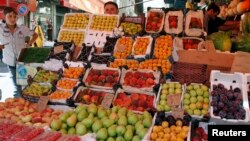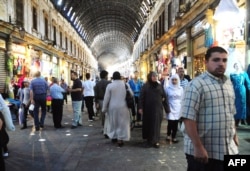DAMASCUS —
As Ramadan began, the mood in Damascus was more festive than a year ago, reflecting perhaps a greater sense of security as government troops make gains against the rebel insurgency.
Many Damascenes have returned from abroad to spend the Muslim holy month with loved ones. Food shops were abuzz with shoppers and butchers and bakers ran low on supplies.
But many shoppers expressed frustration at food shortages and inflated prices.
The Syrian pound has crashed to one sixth of its value two years ago. Although Syria has been self-sufficient in food, fuel shortages lead to a shortage of food in the cities.
On the first day of Ramadan on Wednesday, Damascenes could not find staples such as yogurt. The price of veal, if found at all, was twice what it was a few months ago. Pita bread, a daily staple, was now three times its price a year ago.
Meanwhile, salaries for government workers have not risen. Merchants and private sector workers have seen their businesses come to a standstill, and many complain of a shortage of cash.
“It's a disaster, but somehow people are pulling through. Some share household expenses, some borrow, some just get by on very little and don't complain. That's how we're doing it these days,” said Ayman, 42, an entrepreneur.
The government has begun to address the food crisis. Last week it passed a law forbidding anyone from transporting food out of the country. Some Lebanese and many Syrians who live in Lebanon have been shopping for food in Damascus before taking it back to Lebanon, where everything costs slightly more.
But despite financial troubles, Damascenes seemed keen to get into the festive mood.
Damascus more confident
Although government forces are battling rebels on the outskirts of Damascus, and explosions and aerial bombardments can be heard throughout the city, Damascenes seem more confident and at ease than just a few weeks earlier.
Some believe the government has taken back control of most of the capital's outskirts.
“I don't support the government, but let's face it. It's strong. It's winning. It's not going anywhere,” said Ayman, echoing a common sentiment these days.
Though there are hardly any statistics on kidnappings and the random disappearances that have plagued Damascus over the past year, people seem confident that such incidents have markedly declined in number.
Perhaps evidence of the change in mood was the unusual sighting of President Bashar al-Assad's cousin, Nabhan, who showed up in a city mall with only a small security detail. He was overheard saying that it was his first time he had set foot there in over a year.
The Kafar Souseh mall is located near government buildings, the site of several bomb and mortar attacks in the past months.
On the eve of Ramadan, Damascenes crowded streets and coffee shops. They shopped for last-minute ingredients then raced home to prepare their final meal of the day before sunrise.
The buzz was highly unusual, something the streets of Damascus had not seen in a while.
For months now, the Syrian capital has gone quiet by sunset, as people scurry home for fear of kidnappings, shootings and hostile checkpoints.
Late night meals
But Ramadan is traditionally a month of nocturnal activities, especially when falls in summer. During the day, fasting Muslims stay indoors to avoid the heat and to rest. At night, after they break their fast and spend time in prayer, people go out for a stroll and a late night meal, or visit family with all their children in tow.
In 2010, these Ramadan festivities seemed to have reached a peak. Restaurants and private parties for the meal of Suhur - the final meal before sunrise - went on all night. The scene was so festive that it was near impossible to find a free table at a restaurant at 2 a.m. without a reservation.
The atmosphere was in contrast to the eerie scenes of last Ramadan, which followed the assassination of Assef Shawkat, the president's brother-in-law. Many remember that killing as the arrival in the capital of the country's civil war.
Last Ramadan, everyone scurried home before sunset. During the night, only heavy artillery and fighter jets could be heard. Damascenes said none had ever witnessed such a morose Ramadan.
But in the days before this Ramadan, the streets of Damascus seem to have come to life, with cars blaring music and young people clapping along.
Perhaps adding to the buzz is the fact that so many Syrians have returned home for the holy month.
The Lebanese border was unusually crowded with Syrians on their way to Damascus.
One 47-year-old grandmother, Lamia, said she and her husband and young daughter were returning home from Cairo via Beirut “for good”.
“We hear things are calm now, so here we are. We're back,” she said.
Others flew direct from Cairo to Damascus just in time for Ramadan. Many arrived late at night, forcing family members to make the arduous trip to the airport to pick them up.
One such passenger, Fatma, 70, said she was well aware of the risks, but she had to come home no matter the cost.
“I've had enough of exile. It's time for me to be home,” she said.
Many Damascenes have returned from abroad to spend the Muslim holy month with loved ones. Food shops were abuzz with shoppers and butchers and bakers ran low on supplies.
But many shoppers expressed frustration at food shortages and inflated prices.
The Syrian pound has crashed to one sixth of its value two years ago. Although Syria has been self-sufficient in food, fuel shortages lead to a shortage of food in the cities.
On the first day of Ramadan on Wednesday, Damascenes could not find staples such as yogurt. The price of veal, if found at all, was twice what it was a few months ago. Pita bread, a daily staple, was now three times its price a year ago.
Meanwhile, salaries for government workers have not risen. Merchants and private sector workers have seen their businesses come to a standstill, and many complain of a shortage of cash.
“It's a disaster, but somehow people are pulling through. Some share household expenses, some borrow, some just get by on very little and don't complain. That's how we're doing it these days,” said Ayman, 42, an entrepreneur.
The government has begun to address the food crisis. Last week it passed a law forbidding anyone from transporting food out of the country. Some Lebanese and many Syrians who live in Lebanon have been shopping for food in Damascus before taking it back to Lebanon, where everything costs slightly more.
But despite financial troubles, Damascenes seemed keen to get into the festive mood.
Damascus more confident
Although government forces are battling rebels on the outskirts of Damascus, and explosions and aerial bombardments can be heard throughout the city, Damascenes seem more confident and at ease than just a few weeks earlier.
Some believe the government has taken back control of most of the capital's outskirts.
“I don't support the government, but let's face it. It's strong. It's winning. It's not going anywhere,” said Ayman, echoing a common sentiment these days.
Though there are hardly any statistics on kidnappings and the random disappearances that have plagued Damascus over the past year, people seem confident that such incidents have markedly declined in number.
Perhaps evidence of the change in mood was the unusual sighting of President Bashar al-Assad's cousin, Nabhan, who showed up in a city mall with only a small security detail. He was overheard saying that it was his first time he had set foot there in over a year.
The Kafar Souseh mall is located near government buildings, the site of several bomb and mortar attacks in the past months.
On the eve of Ramadan, Damascenes crowded streets and coffee shops. They shopped for last-minute ingredients then raced home to prepare their final meal of the day before sunrise.
The buzz was highly unusual, something the streets of Damascus had not seen in a while.
For months now, the Syrian capital has gone quiet by sunset, as people scurry home for fear of kidnappings, shootings and hostile checkpoints.
Late night meals
But Ramadan is traditionally a month of nocturnal activities, especially when falls in summer. During the day, fasting Muslims stay indoors to avoid the heat and to rest. At night, after they break their fast and spend time in prayer, people go out for a stroll and a late night meal, or visit family with all their children in tow.
In 2010, these Ramadan festivities seemed to have reached a peak. Restaurants and private parties for the meal of Suhur - the final meal before sunrise - went on all night. The scene was so festive that it was near impossible to find a free table at a restaurant at 2 a.m. without a reservation.
The atmosphere was in contrast to the eerie scenes of last Ramadan, which followed the assassination of Assef Shawkat, the president's brother-in-law. Many remember that killing as the arrival in the capital of the country's civil war.
Last Ramadan, everyone scurried home before sunset. During the night, only heavy artillery and fighter jets could be heard. Damascenes said none had ever witnessed such a morose Ramadan.
But in the days before this Ramadan, the streets of Damascus seem to have come to life, with cars blaring music and young people clapping along.
Perhaps adding to the buzz is the fact that so many Syrians have returned home for the holy month.
The Lebanese border was unusually crowded with Syrians on their way to Damascus.
One 47-year-old grandmother, Lamia, said she and her husband and young daughter were returning home from Cairo via Beirut “for good”.
“We hear things are calm now, so here we are. We're back,” she said.
Others flew direct from Cairo to Damascus just in time for Ramadan. Many arrived late at night, forcing family members to make the arduous trip to the airport to pick them up.
One such passenger, Fatma, 70, said she was well aware of the risks, but she had to come home no matter the cost.
“I've had enough of exile. It's time for me to be home,” she said.












